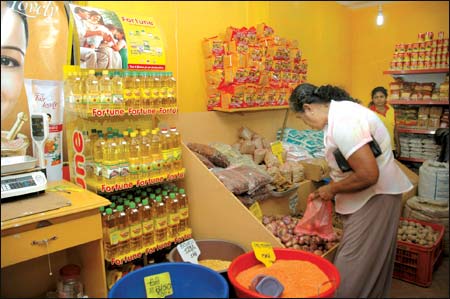|
Despite heavy odds:
Lowering inflation further, Govt's aim
Irangika RANGE
Trade, Marketing Development, Consumer Affairs and Cooperatives
Minister Bandula Gunawardana, in an exclusive interview with the Daily
News, expresses optimism that the prices of goods would continue their
downward trend, reducing the cost of living.
|

Sufficient quantities of essentials at lower rates |
The Minister also says that the Government is in the process of
providing a number of reliefs to benefit the public before the
forthcoming Sinhala and Hindu New Year festival. He outlines plans to
expand the Laksathosa and Co-op branches. The Minister says the UPFA is
assured of victory at the forthcoming WPC election.
Q: Prices of
several items have gone down. Will this trend continue?
A: The prices of a number of essential items such as dhal, B
onion, red onion, sprats, gram, green gram, rice, sugar, potatoes, milk
powder, canned fish and dried chilies have already gone down in the
market due to the Government's removal of taxes on the imports of these
12 items.
The Government for the first time in the history passed the Special
Commodity Levy Act in Parliament in 2007 as relief measure for
consumers. Under this Act, a number of taxes such as Ports and Aviation
Levy (PAL), Social Responsibility Levy, custom duty, surcharges, VAT and
Cess Levy were removed on the imports of essential items.
The important point is when this Act was brought to Parliament, the
Opposition voted against it. This attempt had shown their dislike to
reduce burdens placed on the people.
But as a responsible Government, we are always committed to do our
best to provide relief to the people and passed the Act by overlooking
the oppositions' protest. With the implementation of this program, the
Government has incurred a loss of Rs.10 billion to State revenue last
year. This is equivalent to the total expenditure which can be made on
Samurdhi beneficiaries annually.
Q: Will gas and
fuel prices go down further?
A: We expect that the gas price would go down further
following the gas price reductions in the world market. Even though gas
prices have gone down in the world market, there was no proper mechanism
to provide that relief to the consumer earlier.
|

Minister
Bandula Gunawardana |
Therefore, a gas price formula under the instructions of the Supreme
Court after obtaining the approval of the Cabinet was formulated by the
Consumer Affairs Authority. Under this formula, we evaluate gas prices
to benefit the people following global gas prices fluctuations.
Accordingly, the total price reduction received by consumers during
the last four months was Rs.790 from Laugfs and Rs. 554 from Shell gas.
Last month, the price of a Laugfs gas cylinder (12.5kg) was reduced by
Rs. 334 while the price of a Shell gas cylinder (12.5kg) was reduced by
Rs.310.
The Government also reduced the price of a liter of diesel, furnace
oil and petrol by Rs.40, Rs.37 and Rs.30 respectively through last
year's Budget.
This move has resulted in reducing the cost of production and
transport in various fields. This step has also positively impacted on
passenger transport reducing bus fares by 15 per cent while certain
reductions were seen in train fares too.
Q: Any
possibilities of further reducing milk powder prices?
A: Relief has been granted to milk powder importers to prevent
any negative impact from the world food crisis. Not only multinational
companies but several local importers entered the milk powder imports
following this tax relief.
This has resulted in reducing prices in the market. Meanwhile, to
prevent the unfair price hike, the Government stipulated a maximum
retail price of Rs.260 for a 400g milk pack since December 15 last year.
It is almost a Rs.50 price reduction from each milk powder pack.
Apart from that a trend has been created to consume fresh milk as a
result of several initiatives taken by the Government to popularize
fresh milk among the public. Therefore, opportunities have been provided
to consumers to purchase sufficient fresh milk through the outlets
established countrywide.
Q: What are your
plans to expand Laksathosa network?
A: Fulfilling another pledge given in the Mahinda Chinthana
policy, the Government has come forward in distributing and selling
consumer items by strengthening the Cooperative Movement.
As a result of the revival of this sector, the monopoly maintained by
the private sector on selling and distributing of consumer items was
broken. Sathosa which was driven to bankruptcy by the UNP was
restructured by the Government. It commenced operations under the new
vision. Today Laksatosa has 102 sales outlets operating across the
country for the benefit of consumers.
In addition, 350 Coop-Cities have been set up islandwide including in
the North and East using Rs.1 million for each Coop-City allocated
through the Budget last year. Meanwhile, the Government has also planned
to establish 1000 Mini Coop-Cities with financial assistance of Rs.300
million provided by the 2009 Budget.
Q: Will you find
a mechanism to provide goods at cheaper rates to Northern residents?
A: The Government is actively engaged in fulfilling the needs
of the people living in the North without any shortage.
Various steps have been taken under the instructions of the Senior
Presidential Advisor Basil Rajapaksa MP to provide relief to people in
the North who have undergone great hardships for many decades.
Especially consumer items are being distributed through the appointed
Essential Services Commissioner to the North without any delay.
In order to provide essential items at low rates, Laksathosa branches
have been opened in the Province while new sales outlets will be set up
shortly in the areas where IDPs are living. Sri Lanka State Trading
(General) Corperation is also engaged in dispatching goods directly to
them. Meanwhile, a mechanism has also been formulated to streamline the
distribution of goods received from foreign countries.
Q: How do you
plan to protect local farmers from cheap imports of various food items?
A: Several policy decisions have been taken to protect local
farmers to prevent the influence of multinational companies and
importers. The Government under the Mahinda Chinthana policy has vowed
to protect the local production of dairy, paddy, grain, vegetable and
fruits with the intention of making Sri Lanka self-sufficient. State
initiatives taken to boost the local dairy industry which had collapsed
when this Government came to power, have been successful.
The industry is being revived now with the implementation of a set of
industry-friendly proposals to benefit the farmers to increase the milk
production. Meanwhile, if certain imports threaten any local
manufacturing, the Government directly involves through the imposition
of tax on that item to protect local farmers.
We imposed taxes on several times when the local potato farmers were
threatened by the potatoes imports. Government also provides a bag of
fertilser at a low rate of Rs.350 to farmers. This fertilizer subsidy
has resulted in the reaping of bumper paddy harvest across the country
this Maha season. The farmers also obtain the best price of Rs.30 for a
kilo of paddy for the first time in history.
Q: Will there be
more economic centers in other parts of the country?
A: Initial work to set up several Dedicated Economic Centers (DECS)
have commenced this year.
Therefore, a new DEC in Ratmalana is expected to be opened before the
Sinhala and Hindu New Year festival as a relief measure for the people
living close to the Galle Road. Meanwhile, Nine DECs in Dambulla,
Nuwara-Eliya, Norochcholei, Kalpitiya, Thambuththegama, Meegoda,
Welisara, Veyangoda and Narahenpita are operational at the moment.
Q: How is the
Government controlling the rate of inflation?
A: The Mahinda Rajapaksa Government unlike previous
Governments had faced a number of challenges from the four types of
global crises fuel, energy, food and financial.
Despite these negative impacts, we have been able to reduce the
inflation rate to 10 per cent from 28 per cent through good financial
management. It is a big victory of the Government while combating
terrorism in the North.
Our target is to bring down the inflation rate further to a single
digit in the near future. Though this reduction had not been seen by the
Opposition, people have really felt its benefit. That is why they come
forward to offer their support to the UPFA during the past Provincial
Council elections. |





